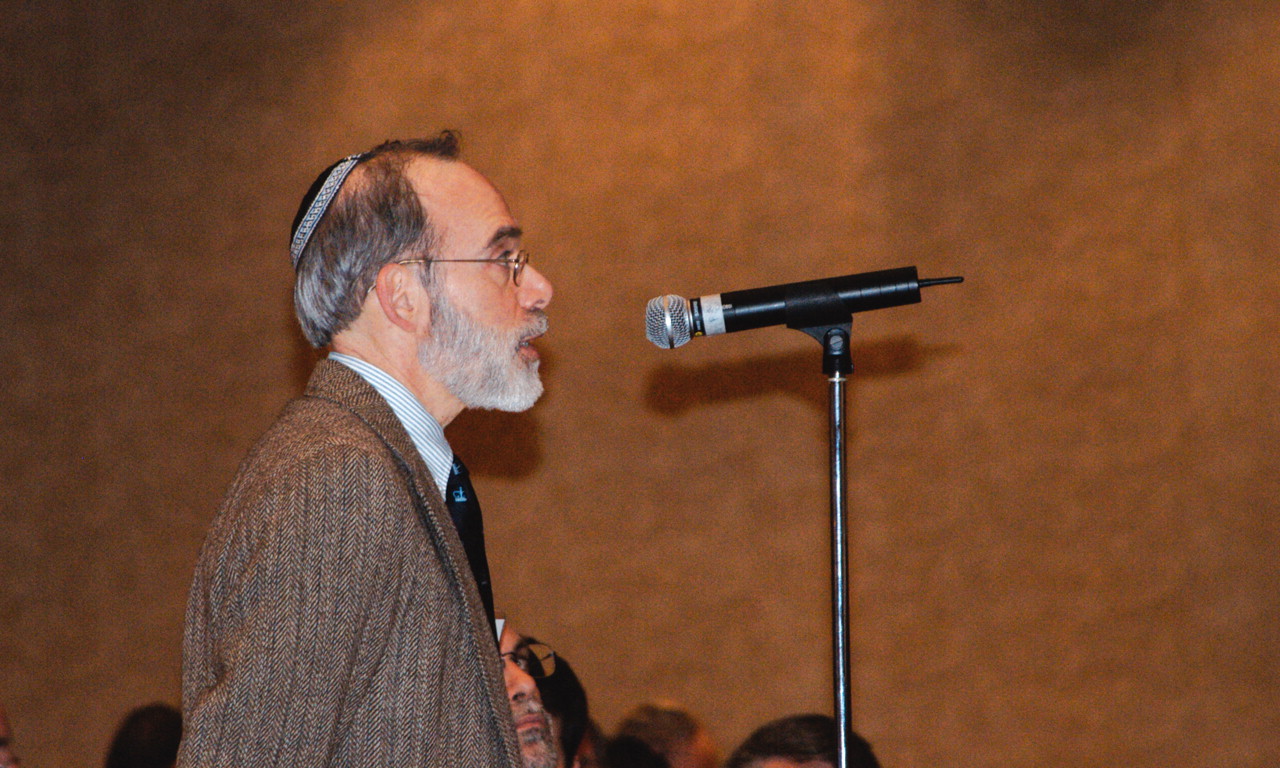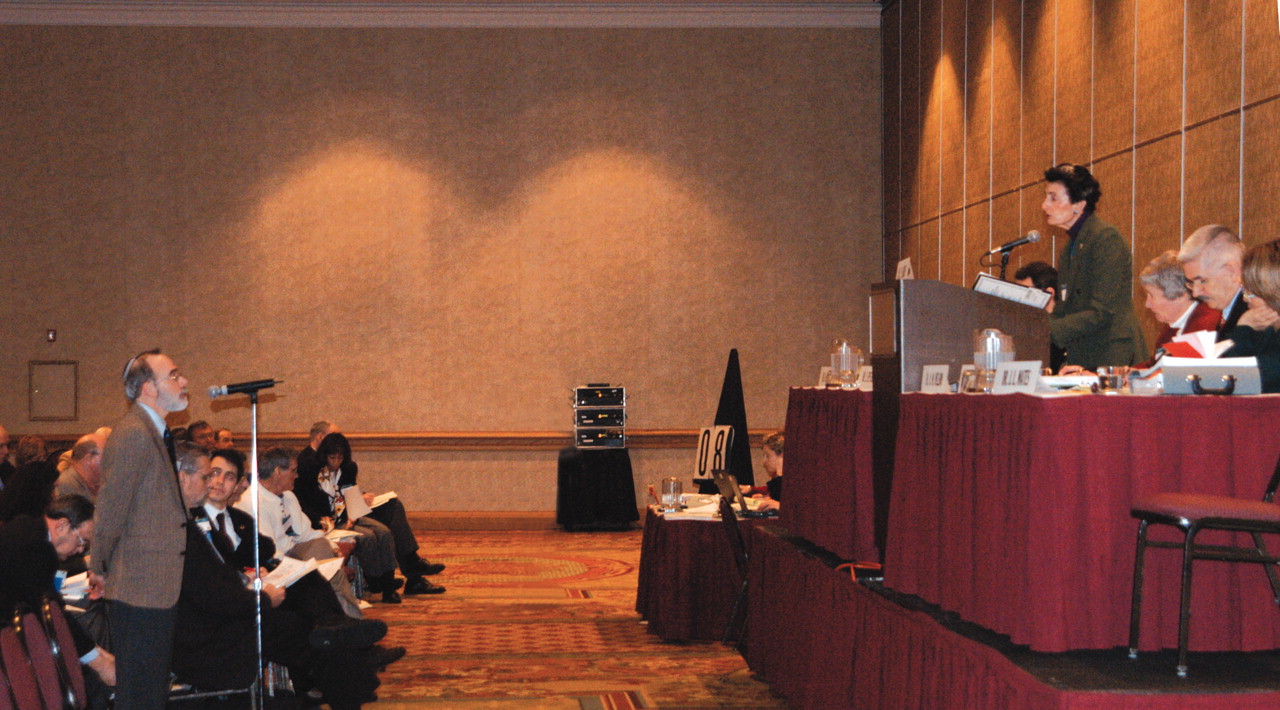The immediate problem of a reduction in Medicare reimbursement of 4.4 percent and the long-range dilemma of a shrinking membership base dominated the AMA House of Delegates meeting in New Orleans last month.
When the meeting opened, the U.S. Senate had adjourned without acting on a House of Representatives bill giving physicians a reimbursement increase averaging 2 percent each year over the next three years.
Instead, according to the AMA, physicians will receive a 4.4 percent cut on March 1, 2003, unless the new Congress acts in January or February.
AMA President Yank D. Coble Jr., M.D., told the House of Delegates that “when the Senate left town, they left behind a festering crisis in medical access for Medicare patients.”
He announced that the AMA planned another Washington Fly-In on January 8 and 9, in which state and national specialty groups, group practices, and health professionals would meet with congressional representatives to urge Congress to act. The AMA had held a similar event in November.
A report of the AMA’s Board of Trustees said that the AMA general counsel and two private law firms concluded that “litigation is highly unlikely to be a successful avenue for fixing the Medicare payment problem. . . .Commencement of litigation gives those who have the ability to solve this problem—that is, CMS and/or Congress—an excuse to defer action.”
On December 10 the House of Delegates staged a demonstration in which physicians chanted, “Fix the mistake. Fix the mistake.”
Patrice Harris, M.D., an alternate APA delegate to the AMA, was featured in an AMA video produced at the meeting that shows physicians describing the impact of the Medicare payment cut on access to care. She explained that the Medicare payment formula is particularly difficult for psychiatrists and their patients because of the 50 percent copay requirement.
The AMA took another step forward in its efforts to develop an organizational structure that would address the related problems of the growth in importance of specialty medical societies and declining AMA membership and revenues.
The AMA lost more than 12,000 members in 2001 and represented 29 percent of U.S. physicians and medical students in 2002. That figure represents a decline from 75 percent representation 30 years ago, according to an article in the April 27, 2002, National Journal.
In June 2002 the House of Delegates voted to develop a business plan for a transition to an “organization of organizations,” including cost analysis and analysis of membership issues and of services to be provided (Psychiatric News, July 19, 2002).
The AMA contracted with the consulting firm McKinsey and Co. to conduct a survey of state medical and specialty societies about their attitudes toward various organizational and funding models for an organization of organizations.
APA’s Board of Trustees directed the staff and delegation to monitor proposals and developments concerning the proposed transition, rather than to respond to the questionnaire. The questionnaire requested information about levels of funding commitments, as well as preferred membership structures.
Incoming APA Medical Director James Scully, M.D., and John McIntyre, M.D., commented to members of the Section Council on Psychiatry that the survey process did not reflect the time needed by specialty societies to reach valid conclusions about funding issues. Similar concerns were raised by other societies.
McKinsey and Co. staff presented the findings to the House of Delegates.
Currently, the AMA collects approximately $50 million in dues. That figure would fall to $10 million under one scenario in which the AMA would cease collecting dues and would depend on state and specialty societies to assess their members. Most societies that responded would commit only 2 percent or less of their gross revenues.
Deterrents to membership in an organization of organizations included costs and the lack of evidence of change in the AMA.
Eighty percent of the respondents said that the governing organization should be smaller. The specialty societies want one meeting a year, as opposed to two.
In terms of desired services, federal-level advocacy is viewed as most valuable, with communications second. Respondents want advocacy concerning regulatory relief, reimbursement, and other physician-centered issues. They show less support for social issues such as gun control and lack of health insurance.
The AMA will convene up to three meetings to discuss proposals for a business plan. Scully, McIntyre, and APA President-elect Marcia Goin, M.D., will attend the first meeting, which will be held February 1 and 2.
Section Council News
APA President Paul Appelbaum, M.D., appointed McIntyre, a former APA president, the new APA senior delegate to the AMA. McIntyre was elected the new chair of the AMA Section Council on Psychiatry as well. Scully said that McIntyre “will provide outstanding leadership for our delegation and the section council as we continue to expand our activities and increase our recognition within the AMA.”
Scully previously held those positions.
David Fassler, M.D., representative of the American Academy of Child and Adolescent Psychiatry (AACAP), was elected vice chair of the section council.
The transition comes at a time when APA and psychiatry are increasing their influence within the House of Delegates. At the house’s June 2003 meeting, the American Academy of Psychiatry and the Law will join APA and AACAP as members of the Section Council on Psychiatry. With that addition, the section council will have nine voting members in the House of Delegates.
Also at the June meeting, Jeremy Lazarus, M.D., will run for vice speaker of the House of Delegates. Lazarus is chair of APA’s Council on Advocacy and Public Policy.
Psychiatrist Emmanuel Cassimatis, M.D., will run for re-election as a member of the Council on Medical Education.
One indication of psychiatry’s increased influence, Scully told the section council, is the convening of a roundtable discussion on nonphysician scope-of-practice legislative initiatives, which will be held at the AMA State Legislative Conference in January.
Scully told Psychiatric News, “We’re pleased that the AMA responded to the concerns about scope of practice that the section council brought to the House of Delegates last June.”
Scully will meet with AMA Executive Vice President Michael Maves, M.D., and several state and specialty society senior executives in a special session prior to the AMA conference.
Several presidents of APA’s district branches will attend the panel about scope of practice at the state legislative meeting. Goin, APA’s president-elect, will represent APA, and Lazarus will be a presenter.
Carolyn Robinowitz, M.D., a member of the AMA’s Council on Scientific Affairs (CSA), was quoted in Reuters Health as urging AMA delegates who “might still need convincing on the existence of racial disparities” to consider that the CSA produced “a report that contains six pages of text and 11 pages of references.”
The CSA report calls on the AMA to work with other organizations and agencies, including the U.S. Department of Health and Human Services, to develop strategies aimed at eliminating the disparities. It also asks the AMA to develop “evidence-based performance measures that adequately identify socioeconomic and racial/ethnic disparities in quality.”
Robinowitz was on a panel that presented the results of studies about racial and ethnic disparities in health care to the House of Delegates.
Key Resolutions and Actions
APA section council members testified in support of the following resolutions. The House of Delegates voted to
• Instruct the AMA to prepare a compendium of AMA policies on nonphysician professional scope-of-practice legislative and regulatory initiatives for distribution to the Federation of State Medical Boards (FSMB) and to state medical societies. APA, AACAP, and the Colorado delegation introduced the resolution, which noted that the FSMB is the national leader in the field of medical regulation and that the state medical licensure boards are the principal entities charged with maintaining and improving the quality of health care in the states.
• Continue to identify and work toward the repeal of the “onerous provisions” in the HIPAA legislation and regulations, including its criminal liability provisions, and work to redress the breaches of patient confidentiality that the HIPAA regulations have allowed. APA President Paul Appelbaum, M.D., testified in favor of this resolution. His previous testimony at the June 2002 AMA meeting was instrumental in establishing the idea that privacy rights should be protected and not included with unnecessary “onerous provisions.”
• Accept a report of the board of trustees that recommends the study of the use of interpreters for patients with limited English proficiency and states that “physicians cannot be expected to provide and fund these nonmedical services for their patients, as the Department of Health and Human Services’ policy guidance currently requires.”
• Accept a report of the board of trustees that recommends that “e-mail should not be used to establish a patient-physician relationship” and includes other protections concerning privacy.
• Accept an amended report of the board of trustees that supports the continuation of the J-1 visa waiver program and encourages better coordination of governmental agencies in monitoring the placement and enforcement of physicians’ services requirements.
• Accept an amended report of the board of trustees that recommends that the AMA support the creation of state Medicaid Physician Advisory Commissions that would advise states on payment policies, utilization of services, and other relevant policies impacting physicians and patients.
• Accept a report of the board of trustees that recommends that a physician’s personal medical history is private and should remain confidential and that only information regarding current health status should be required for credentialing purposes.
•
Pass a resolution recommending that the AMA support congressional action authorizing the Food and Drug Administration to require evaluation by pharmaceutical companies of the safety and efficacy of appropriate new and marketed drugs in children. The resolution was supported by APA and AACAP (see
page 4). ▪


